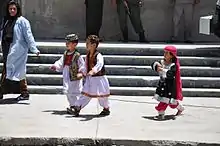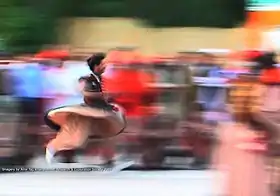 Boys wearing khet partug | |
| Type | Dress |
|---|---|
| Introduced | Historical |
Khetpartug (Pashto: خت پړتوګ, khət paṛtūg) khat partoog, is a type of Pashtun clothing worn in Afghanistan.
Origin
Khetpartug originated in Afghanistan.
Design
Khet
The khet is the upper garment which is loose and slightly tightened at the waist and is more like a tunic or a robe, similar to a smock with wide sleeves and reach below the knees.[1][2] The khet does not traditionally have side slits,[3] and is worn with a belt at the waist.[4]
Partug
The partug is the lower garment which is very loose and full of pleats, with folds all around the waist and made of yards of material.[5] Khet partug is also similar to the costume worn by men dancing the attan.[6]
Photo gallery
 Traditional khet partug (traditional loose Peshawari shalwar) (1842)
Traditional khet partug (traditional loose Peshawari shalwar) (1842) Khattak dancer wearing khet partug
Khattak dancer wearing khet partug The main street in the bazaar at Caubul; men wearing khet partug (1842)
The main street in the bazaar at Caubul; men wearing khet partug (1842) Durrani chieftains wearing khet partug
Durrani chieftains wearing khet partug
See also
References
- ↑ Elphinstone, Mountstuart (1815) An Account of the Kingdom of Caubul, and Its Dependencies in Persia, Tartary, and India: Comprising a View of the Afghaun Nation, and a History of the Dooraunee Monarchy
- ↑ "The Culture of Afghanistan".
- ↑ Voice of America (13.06.2012)
- ↑ Cultural Dresses Khyber.org[usurped]
- ↑ Sadana, Ravi (1999) The Three Verbs of Being
- ↑ "Perahan Tunban, Kamiz Shalwar, Afghanistan Men Clothing".
This article is issued from Wikipedia. The text is licensed under Creative Commons - Attribution - Sharealike. Additional terms may apply for the media files.